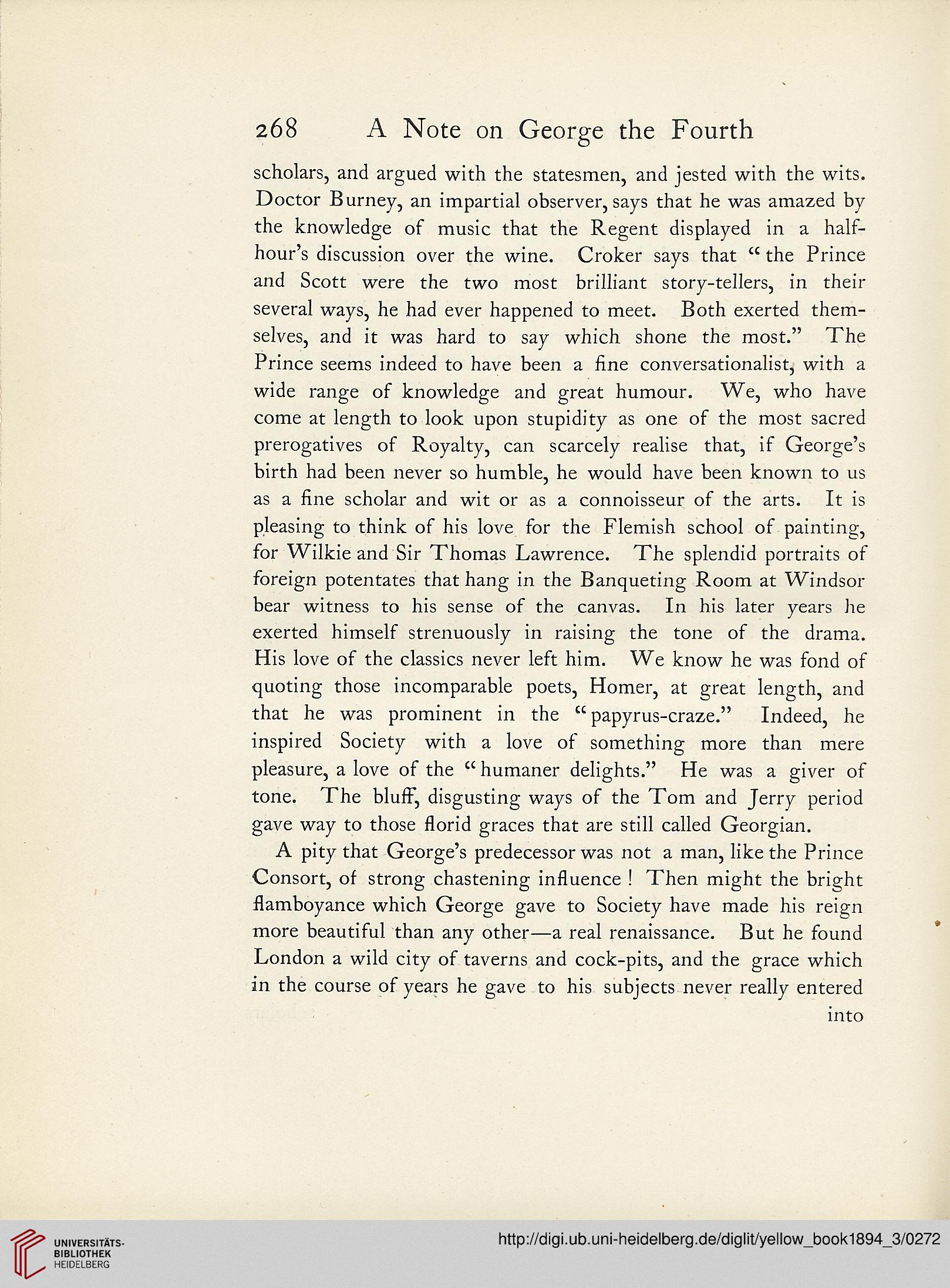268
A Note on George the Fourth
scholars, and argued with the statesmen, and jested with the wits.
Doctor Burney, an impartial observer, says that he was amazed by
the knowledge of music that the Regent displayed in a half-
hour's discussion over the wine. Croker says that " the Prince
and Scott were the two most brilliant story-tellers, in their
several ways, he had ever happened to meet. Both exerted them-
selves, and it was hard to say which shone the most." The
Prince seems indeed to have been a line conversationalist, with a
wide range of knowledge and great humour. We, who have
come at length to look upon stupidity as one of the most sacred
prerogatives of Royalty, can scarcely realise that, if George's
birth had been never so humble, he would have been known to us
as a Ane scholar and wit or as a connoisseur of the arts. It is
pleasing to think of his love for the Flemish school of painting,
for Wilkie and Sir Thomas Lawrence. The splendid portraits of
foreign potentates that hang in the Banqueting Room at Windsor
bear witness to his sense of the canvas. In his later years he
exerted himself strenuously in raising the tone of the drama.
His love of the classics never left him. We know he was fond of
quoting those incomparable poets, Homer, at great length, and
that he was prominent in the "papyrus-craze." Indeed, he
inspired Society with a love of something more than mere
pleasure, a love of the " humaner delights." He was a giver of
tone. The bluff, disgusting ways of the Tom and Jerry period
gave way to those Aorid graces that are still called Georgian.
A pity that George's predecessor was not a man, like the Prince
Consort, of strong chastening inAuence ! Then might the bright
Aamboyance which George gave to Society have made his reign
more beautiful than any other—a real renaissance. But he found
London a wild city of taverns and cock-pits, and the grace which
in the course of years he gave to his subjects never really entered
into
A Note on George the Fourth
scholars, and argued with the statesmen, and jested with the wits.
Doctor Burney, an impartial observer, says that he was amazed by
the knowledge of music that the Regent displayed in a half-
hour's discussion over the wine. Croker says that " the Prince
and Scott were the two most brilliant story-tellers, in their
several ways, he had ever happened to meet. Both exerted them-
selves, and it was hard to say which shone the most." The
Prince seems indeed to have been a line conversationalist, with a
wide range of knowledge and great humour. We, who have
come at length to look upon stupidity as one of the most sacred
prerogatives of Royalty, can scarcely realise that, if George's
birth had been never so humble, he would have been known to us
as a Ane scholar and wit or as a connoisseur of the arts. It is
pleasing to think of his love for the Flemish school of painting,
for Wilkie and Sir Thomas Lawrence. The splendid portraits of
foreign potentates that hang in the Banqueting Room at Windsor
bear witness to his sense of the canvas. In his later years he
exerted himself strenuously in raising the tone of the drama.
His love of the classics never left him. We know he was fond of
quoting those incomparable poets, Homer, at great length, and
that he was prominent in the "papyrus-craze." Indeed, he
inspired Society with a love of something more than mere
pleasure, a love of the " humaner delights." He was a giver of
tone. The bluff, disgusting ways of the Tom and Jerry period
gave way to those Aorid graces that are still called Georgian.
A pity that George's predecessor was not a man, like the Prince
Consort, of strong chastening inAuence ! Then might the bright
Aamboyance which George gave to Society have made his reign
more beautiful than any other—a real renaissance. But he found
London a wild city of taverns and cock-pits, and the grace which
in the course of years he gave to his subjects never really entered
into




